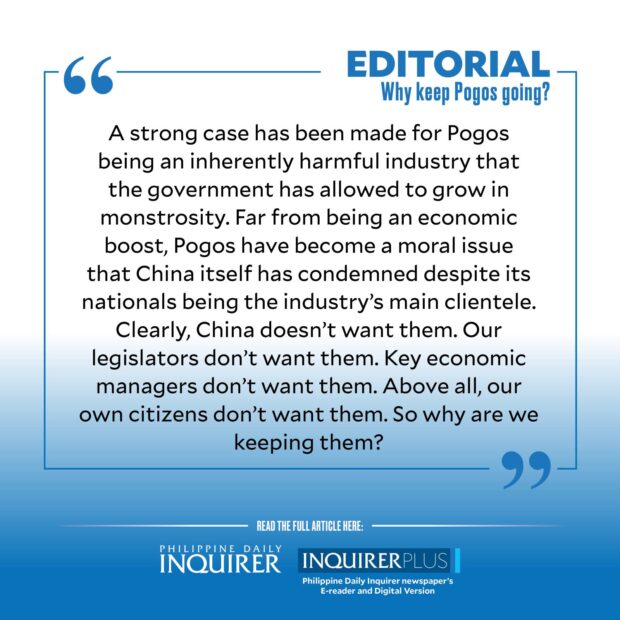
“It’s game over for the Pogo industry,” Gatchalian said when he presented his panel’s report to the Senate plenary in March. The Senate ways and means committee, which he chairs, had conducted hearings on the impact of Pogos on the country, following the spate of crimes associated with these ubiquitous Philippine-based gambling operations that cater mainly to gamblers from China, where gambling is illegal.
Noting that Filipinos “stand to lose more than they will gain” from Pogos, Gatchalian recommended “the permanent banning of offshore gaming operations in the Philippines,’’ adding that they have become “more of a liability than an asset to the [country’s] economic and social order.” Citing data from the Philippine National Police, Gatchalian said these operations have become a haven of criminality, with over 100 kidnap-for-ransom and other crimes involving Pogos reported since 2017.
In May this year, police raided a cyber marketing company inside the Clark Freeport Zone in Pampanga and rescued 919 foreigners and 171 Filipinos suspected of being victims of trafficking. Last month, a controversial police operation rounded up 2,714 individuals, majority of them Filipinos, during a raid on a Pogo firm in Las Piñas City. The operation was however criticized by Justice Secretary Crispin Remulla as a “fishing expedition” by the PNP’s Anti-Cybercrime Group, which he said did not coordinate with the Department of Justice’s Inter-Agency Council Against Trafficking. The incident illustrates how Pogos have diverted so many resources of law-enforcement agencies, even generating unnecessary turf wars among them.
Aside from criminal activities, Gatchalian noted that Pogos have also become a breeding ground for financial crimes, such as money laundering and tax evasion. Because operations are internet-based, he said regulators such as the Philippine Amusement and Gaming Corp. (Pagcor) have limited access to their financial transactions. Last year, the Commission on Audit noted that Pagcor had failed to collect P2.3 billion from Pogos since December 2021.
But what of its economic benefits? Gatchalian said these are “overrated, moderate, and erratic,” as collections accounted for only a small portion of taxes. He said a cost-benefit analysis of the industry shows that it stands at negative P8.44 billion. “In short, Pogos are only contributing a little to our economy. That’s why it’s not enough reason to say the economy will be on the losing end if we abolish Pogos,” the senator said.
Gatchalian also pointed out that China itself has issued statements against Pogos which are being used by Chinese nationals to violate China’s anti-gambling law. “I can imagine the Philippine government would react in a similar way if a foreign ally were allowing Filipinos to bet on prohibited games like ‘jueteng’ or ‘e-sabong’ through online casinos housed in another country,” he said.
But is there basis for the senator’s optimism that the country is “very close” to finally outlawing Pogos?
In April, Gatchalian submitted the panel report to Executive Secretary Lucas Bersamin, and revealed that he had a recent conversation with President Marcos on how “we have nothing to lose economically” from stopping Pogos. “I also told him that all economic managers have agreed to ban Pogos because of the so-called reputational risks.” Mr. Marcos, he added, expressed “concern” about Pogo-related crimes.
That may be all for naught, however, as the President has resisted the clamor to ban Pogos, arguing that the “problems come from illegal, not the legal, ones.” Yet there is little indication that the government can control even the “legal” Pogos.
If the national government were to exercise more political will in dealing with Pogos, it can look to the local governments of Pasig and Valenzuela for inspiration.
Recall that in December 2022, Pasig City Mayor Vico Sotto approved a local ordinance prohibiting the issuance of permits to operators of Pogos, as well as other online gaming activities. Sotto noted that Pogos and gambling undermine the social, moral, and economic growth of the city, and have long been a source of corruption.
Pasig’s lead was followed by Valenzuela City with Mayor Weslie Gatchalian announcing last week the issuance of three ordinances banning Pogos, small-town lottery, and all kinds of gambling there.
A strong case has been made for Pogos being an inherently harmful industry that the government has allowed to grow in monstrosity. Far from being an economic boost, Pogos have become a moral issue that China itself has condemned despite its nationals being the industry’s main clientele. Clearly, China doesn’t want them. Our legislators don’t want them. Key economic managers don’t want them. Above all, our own citizens don’t want them. So why are we keeping them?

